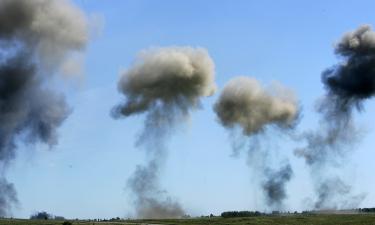America's Most Hated and Clueless Man Goes, Any Hope Left?
During the second quarter of the year, Britain's BP that suffered an accident on its oil platform in the Gulf of Mexico has lost $17.15 billion. Analysts predict that the company will be in the red for at least another two quarters, and this is despite the resignation of Tony Hayward, BP’s executive director and “the most hated person in the USA.”
The Board of Directors of BP has approved a plan to appoint American Robert Dudley, the former head of the Russian-British TNK-BP and the present head of BP office responsible for disaster recovery in the Gulf of Mexico, the CEO of the company, RIA Novosti reports.
Hayward had worked in the company for 28 years, of which the last three years as an executive director of BP. The rumors about the imminent resignation of Tony Hayward appeared repeatedly, but every time the company denied them. Harsh criticism of the executive director began after the accident in the Gulf of Mexico. The criticism has greatly undermined the position of the British company both financially and socially.
Deepwater Horizon platform sank on April 20 of this year on the drilling platform off the coast of Louisiana after a 36-hour fire, which followed a powerful explosion. As a result of the accident 11 workers were killed.
The leak became the worst environmental disaster in the U.S. history, surpassing in size the accident on Exxon Valdez tanker in 1989. Then, nearly 260 thousand barrels of oil spilled into the sea as a result of an accident with Exxon Company tanker, forming an oil spill covering 28 square kilometers.
BP’s expenses for the liquidation of the oil spill near four billion dollars. This amount includes the cost of rectification of consequences, the cost of construction of additional relief wells, wells sealing, grants for coastal countries and payment of claims. The company has already received at least 116 thousand claims from victims; 67.5 thousand claimants have been paid $207 million.
A net loss of BP for the second quarter of 2010, according to US GAAP reporting, has amounted to $17.15 billion against $4.385 billion profit for the same period last year. BP’s loss for six months amounted to $11.071 billion.
However, analysts of FG Kalita-Finance say that the resignation of CEO of the company has to do more with the issue of the reputation rather than the executive’s inability to fulfill his duties.
“Some American journalists call Mr. Hayward “the most hated person in the U.S.,” although the head of BP most likely was doing all he could within his competence to resolve the issue. It is unlikely that the situation will change for the better with the arrival of a new director. Yet, the public made its “verdict” to Tony Hayward. Even Obama in one of his comments said that Hayward would be fired if he worked in the Presidential Administration,” they said.
“The financial data is, of course, disappointing, but one can hardly speak about any surprises. The problems in the Gulf of Mexico are ongoing, and the oil company will bear losses for at least another two quarters, because even after stopping the leak, BP will still bear the costs of mitigation actions and compensations,” Kalita-Finance analysts say.
And yet, it is still unclear if BP is to blame. Earlier, soon after the accident, some media outlets reported that the operator, owner and service company serving platform that sank in the Gulf of Mexico are shifting the blame for the catastrophe to each other.
BP officials told the U.S. senators that the cause of the oil spill was malfunction of the device that was to block the well in case of an accident. However, representatives of the Swiss company Transocean, which manufactured this device, said in the Senate that the control over the platform was fully implemented by BP.
People from Transocean also mentioned that the cause of the accident has largely been the design of the well built by the American company Halliburton. In turn, representatives of Halliburton argued that the work was carried out in accordance with all industry standards and BP requirements.
Whatever it may be, American authorities could use ousting a large non-local competitor from the market, especially with the support of public opinion.
As Kalita-Finance analysts previously mentioned to Bigness.ru, “even if BP is able to fully solve the issue with the accident in the Gulf, they cannot count on a “quiet life” in the U.S., and every project of the company will be thoroughly considered by both the authorities and regulators, and the public.”
“Perhaps now it would be wise to leave the large, but extremely unfriendly (to the British company) American market, for some time. And it is not so much the desire of the U.S. authorities to remove non-local competitor, but it is the attitude of citizens and companies in the U.S., that, when possible, will avoid BP products due to the prevailing negative image of the destroyer of American ecology,” they said.
Ekaterina Evstigneyeva.
Subscribe to Pravda.Ru Telegram channel, Facebook, RSS!




